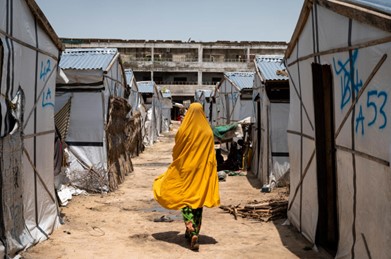News
Girls living in extremely fragile countries are twice likely to be married before age 17 – SCI

Save the Children International (SCI) has stated that adolescent girls living in countries labeled ‘extremely fragile’ are twice as likely to be married before the age of 17 compared to those in more stable regions.
The organisation revealed this at its latest Global Girlhood analysis released to mark the 2024 International Day of the Girl.

According to SCI, every 30 seconds, an adolescent girl is married in countries ranked as fragile states and child marriage hot spots.
The new analysis found that eight out of the ten worst-affected nations are in Africa, with the Central African Republic, Chad, and South Sudan topping the list, followed closely by Somalia and Eritrea.
The report disclosed that approximately 32 million adolescent girls are living in these fragile regions.
The SCI findings highlight a disturbing link between state fragility and child marriage. In these high-risk areas, one in four girls will give birth before turning 18, often without access to necessary medical care.
The report underscores the growing number of fragile nations. The OECD’s 2022 States of Fragility report lists 60 countries as fragile, up from 57 in 2020. Among them, 15 are deemed ‘extremely fragile,’ affecting 170 million adolescent girls. This increase is driven by factors like poor governance, conflict, and climate disasters.
Child marriage, as the report notes, leads to devastating long-term consequences for girls, stripping them of their rights to education, health, and safety. Early marriages perpetuate cycles of poverty and vulnerability, increasing girls’ exposure to violence, health risks during childbirth, and a higher likelihood of contracting HIV/AIDS.
As the world marks International Day of the Girl, Save the Children International call for urgent global attention and action to protect these girls and ensure their futures are not cut short by early marriage and its harmful consequences.
Inger Ashing, CEO of Save the Children International, said:
“Our latest report reveals a devastating link between child marriage and fragile states, with girls living in extremely fragile countries twice as likely to marry than girls in countries experiencing periods of greater stability. The picture is bleak for these children; right now, no fragile country is on track to achieve the Sustainable Development Goals on ending hunger, ensure education and health for all, or gender equality.
“Fragility has also increased since the COVID-19 pandemic and is linked to many of the new crises we see today, eroding the systems communities rely on for healthcare, safety, education and income.
“Persistent and unaddressed inequalities, the climate crisis and the erosion of children’s and human rights mean that girls’ lives continue to be shaped by a cycle of crisis and recovery. And this will continue unless urgent action is taken.
“Governments are ultimately responsible for guaranteeing the rights of all people within their borders. For governments in fragile settings this is more difficult as they face the dual challenge of needing to do more to protect girls rights at a time when they are less able to deliver that support. More resources are needed to support the governments, civil society organisations and communities – including girls – in fragile settings to ensure they can respond to the needs. The governments of the fragile countries, UN agencies, civil society organisations, and donors must work together to ensure girls’ rights are protected.”

























